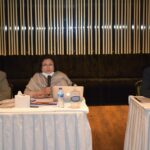LAHORE, Pakistan: The Centre for Social Justice (CSJ) has launched its Research Study titled “Quality Education Vs Fanatic Literacy” in Lahore on Tuesday.
The Research Study has been co-authored by eminent experts Dr. A H Nayyar, Dr. Riaz Shaikh, Dr. Pervez Hoodbhoy, Tahira Abdullah, Professor Anjum James Paul, Dr. Baela Raza Jamil/ Laraib Niaz, and edited by Peter Jacob.
It brings a unique analysis of textbooks, curriculum, and education policy in use in Khyber Pakhtunkhwa, Punjab, Sindh, and Federal Directorate of Education (FDE).
In sum, this content and policy analysis on textbooks underlines the potential of religious inclusion and aspects of religious discrimination, and the portrayal of religious minorities.
The descriptive analysis is particularly relevant because it coincides with the introduction of a Single National Curriculum for primary, secondary, and higher secondary classes by the Ministry of Federal Education.
Speakers at the launch which included rights activists and experts, Baela Raza Jamil, A H Nayyar, Peter Jacob, Professor Anjum James Paul, Riaz Ahmed Shaikh, and Bushra Anjum Butt elaborated on the issues related to education and textbooks.
The CEO Idara Taleem-o-Agahi Baela Raza Jamil said that the learning materials such as textbooks were the most powerful means of inculcating positive attitudes among the students building an inclusive society and achieving quality education.
Baela Raza Jamil added that teaching religion in public educational institutions is fraught with tensions, and caused exclusion of minority groups in South Asian countries.
She further urged that the New Policy and Single National Curriculum being prepared should focus on improving the quality of textbooks and content, aided by an effective implementation plan. The amount and sequence of learning material proposed in the policy should be able to inspire creative imagination among the children.
Moreover, transitioning from one phase to the other should be age-sensitive and in a logical order, e.g. from local to global, for better learning outcomes.
Renowned educationist and contributor Abdul Hameed Nayyar appreciated the fact an updated research study, on long-standing issues has been possible.
Abdul Hameed Nayyar underlined the violation of Article 22 (1), which states that “No person attending any educational institution shall be required to receive religious instruction, or take part in any religious ceremony, or attend religious worship, if such instruction, ceremony or worship relates to a religion other than his own”.
He regretted to note that authors and textbooks boards across the country have been violating this constitutional safeguard for the rights of religious minorities.
Therefore, he demanded that the textbooks of non-religious subjects should not contain any religious lessons in the books being prepared under the new curriculum policy.
The Dean of the Department of Social Sciences in SZABIST Riaz Ahmed Shaikh shared the findings of the study which revealed that there is a dire need to introduce more learning content with respect to sensitivity towards other religions, peace-building, acceptance, and tolerance.
Riaz Ahmed Shaikh explained that Public school textbooks often were found to have stereotypes and biases towards religious minorities and they were either referenced derogatory manner or their mention is omitted altogether.
The Chairman PMTA Anjum James Paul discussed his article from the study which presented a descriptive content analysis on Public sector textbooks of the Federal Directorate of Education.
Anjum James Paul emphasized that school textbooks are often the first, sometimes, the only source of reading and learning for students and one-sided portrayals of historical events, biases, prejudices, and stereotypes can potentially affect how students develop their understandings about religious minorities.
The Chairman PMTA requested the government for a comprehensive and efficient plan to oversee the new curriculum and textbooks from the lens of religious Inclusion and diversity.
The MPA & Member Standing Committee for Higher Education Punjab Bushra Anjum Butt termed the research a meaningful contribution for all stakeholders.
Bushra Anjum Butt further expressed that the efforts of the government are only to bring a uniform curriculum and not a uniform education system.
“In order to make our education system uniform, we need equal educational facilities for all despite the difference of class, religion, language, gender or race,” she said.
She further stated that the education system in Pakistan has been subject to changes using different approaches in the past but unfortunately the unstable political environment has hindered equal education opportunities for all.
Despite differences, we should recognize that a wide acceptance of diversity either religious or ethnic would be essential for strengthening the foundation of Pakistan as a democratic dispensation and a vibrant society.
The Executive Director CSJ Peter Jacob said that it was evident that quality textbooks require continuous & rigorous research, improvement, and development.
“This research study presents a detailed assessment of the content of the approved textbooks by respective federal and provincial textbook boards,” he said.
Peter Jacob urged that the respective education ministries would consider the recommendations under the Single National Curriculum and for the new Education policy.


